Barney Frank, Ever the Politician, Predicts Hillary Clinton Is ‘Gonna Win’ in 2016
The former congressman brought his brand of D.C.-style real talk, and his unabashed support for Hillary Clinton, to the Hammer Museum in Los Angeles on Tuesday night.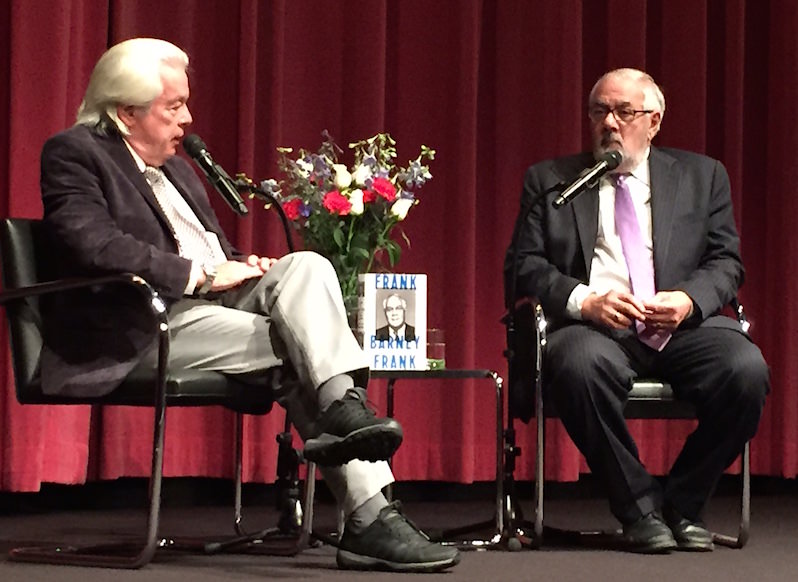 Moderator Ian Masters, left, talks with former Congressman Barney Frank at the Hammer Museum in Los Angeles on Tuesday. (Kasia Anderson)
Moderator Ian Masters, left, talks with former Congressman Barney Frank at the Hammer Museum in Los Angeles on Tuesday. (Kasia Anderson)
Former Massachusetts Congressman Barney Frank spent much of his career as a kind of Capitol Hill anomaly — for years the most prominent openly gay legislator around, and one who espoused viewpoints that some conservative opponents were quick to brand as socialist.
However, it isn’t his self-described “democratic socialist” colleague, Sen. Bernie Sanders, to whom Frank gives his endorsement in the current presidential contest — it’s Hillary Clinton. If this puts him in the company of cynical political operatives who subscribe to a lesser-evil approach in picking candidates, Frank appeared unconcerned about that possibility during his exchange Tuesday night with journalist Ian Masters at the Hammer Museum in Los Angeles.
“I think she’s gonna win,” Frank announced bluntly, drawing scattered murmurs from a crowd that, given the evening’s topic and speaker, probably included more than a few Sanders supporters.
The occasion for the Frank talk was, in part, to eyeball the 2016 White House contest a year and a day before the election with input from the audience and KPFK radio mainstay Masters. It was also a chance for the 75-year-old congressional veteran to plug his new book, “Frank: A Life in Politics from the Great Society to Same-Sex Marriage.” “I’m making a lot of money for a lot less work, now that I’m not in Congress,” he quipped, also unapologetically.
But back to Clinton and Sanders. Frank has been upfront about taking a (purportedly) pragmatic stance on Democrats’ chances in 2016; as one example, he wrote an op-ed piece for Politico in July with the completely unsubtle headline “Why Progressives Shouldn’t Support Bernie,” quashing in one stroke any doubts as to where his loyalties lie. As Frank put it at the Hammer, “If I thought a 75-year-old Jewish liberal could win, I’d run.”
Further damning Sanders with faint praise, Frank offered a glimpse of his own political philosophy, which appeared buoyed by a sense that the system still works: “You play roles,” he said. “It’s important in a political system to have outsiders. That doesn’t mean you have to run.” The U.S. has always harbored a particularly virulent strain of “socialism-phobia,” he said, and curing it would be a good thing in general — “just not while running for president.”
Also apparent was his faith in the Clintonian Mystique, beyond considerations of mere electability. When asked point-blank by an audience member why he thought Hillary is “trustworthy,” Frank harked back to the Clinton I era: “Because I’ve watched her first of all as a very liberal advocate within her husband’s administration.” What’s more, he claimed, during the tense days of the Bill Clinton impeachment rigmarole and attendant Kenneth Starr investigation, an inside source admitted to Frank that it’d be inaccurate to say the Clintons had been “exonerated” after potentially incriminating inquiries had been exhausted, “because there was never anything that implicated them.” The audience was thus invited to accept that somewhat vague vote of confidence on anecdotal evidence alone.
Frank acknowledged that Clinton had recently changed her position on the Trans-Pacific Partnership and before that on same-sex marriage, but he was once again at her service with a rather lawyerly deflection maneuver: He played the Paul Wellstone card. According to Frank, toward the end of the 1990s, the late, lauded progressive senator from Minnesota had been forced to favor the Defense of Marriage Act in order to be re-elected. Frank had understood Wellstone’s choice and flew to Minnesota to support him. Times change, and with them politicians.
Frank also believes that Clinton will come around on the military budget, a topic on which he drew more robust support Tuesday night. Stating that the current level of defense spending makes addressing income inequality impossible, Frank advocated cutting it by 25 percent annually, as “we can be the strongest nation in the world a lot more cheaply.” As for our current slew of foreign entanglements, including Syria, he said Americans shouldn’t be naive about official statements on “sending advisers” to areas that look more like war zones every day. “Those ‘advisers’ are shooting people,” he said.
Other one-liners that landed well: “Citizens United was the worst activism in history,” “Let people die when they want to,” “Regulation [such as the Dodd-Frank Act of 2010] has clearly diminished financial manipulation” and “People who are furious that their income is going down vote for people who ensure it goes down.”
On that last note, Frank dedicated a moment to indulge in some old-fashioned partisan boosterism, noting that “there has never been a time when nobody wanted to be speaker of the House” and cracking that outgoing Speaker John Boehner had been found guilty of “conspiracy to commit government.” Perhaps relishing the plight of his former detractors, Frank traced the fault lines within GOP ranks, perhaps mischaracterizing the left by contrast: He didn’t acknowledge the viewpoints of Green Party supporters, for example, or of those who believe the existing system in Washington is broken beyond repair.
That system apparently works for Frank, who brought this kind of D.C.-style real talk to L.A. on Tuesday: “If you do not want any public policy decisions to be influenced by politics, do not ask 535 politicians to make them,” he said, pointing to the number of members of Congress.
And as he made his way to the lobby for the book-signing portion of the evening’s program, it was clear he still counted himself among their ranks.
Your support matters…Independent journalism is under threat and overshadowed by heavily funded mainstream media.
You can help level the playing field. Become a member.
Your tax-deductible contribution keeps us digging beneath the headlines to give you thought-provoking, investigative reporting and analysis that unearths what's really happening- without compromise.
Give today to support our courageous, independent journalists.
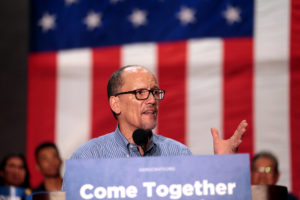
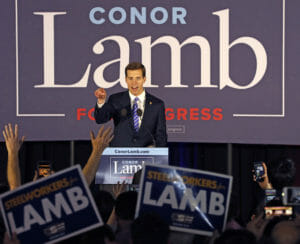

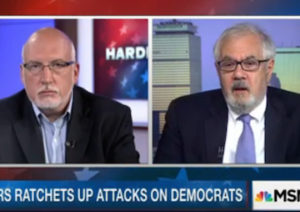
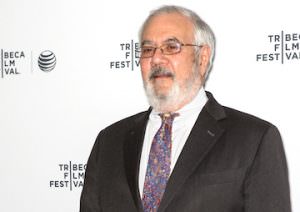
You need to be a supporter to comment.
There are currently no responses to this article.
Be the first to respond.